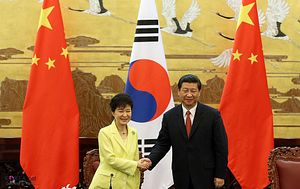Beijing’s dual focus on emphasizing Japanese atrocities during WWII and memorializing Korea’s anti-colonial struggle against Japan has brought China and South Korea closer together in pursuing their mutual goal of countering the increasingly assertive and revisionist government in Tokyo. The strategy of highlighting the history of shared victimhood is effective because it carries currency in both countries where the people are already intimately familiar with the narrative.
However, Seoul and Beijing should be wary of taking this collaboration too far. After all, the two countries have long and bitter disputes over their own overlapping histories and revanchism often blurs the difference between allies and adversaries.
One such conflict exists in the two countries’ struggle over the identity of the ancient proto-Korean kingdom of Goguryeo (37 BC – 668 AD). In 2002, the Chinese Academy of Social Science, a government-backed think tank, began examining Goguryeo history and classified the kingdom as a vassal state of China, sparking outrage in South Korea. The tension was exacerbated when Chinese media began referring to the kingdom as “China’s Goguryeo” (Zhongguo Gaogouli) after Beijing sought UNESCO world heritage site status for the tombs of Goguryeo kings in Manchuria. This, along with the omission of Goguryeo from the summary of Korean history on the Chinese Ministry of Foreign Affairs’ website, triggered protests and cyber-activism in South Korea where the move was perceived as China attempting to impose cultural imperialism.
While this conflict over historical ownership may look inane, Goguryeo arouses feelings of immense pride among Koreans. As a result, the Goguryeo controversy eventually led the South Korean government to establish a committee on Goguryeo history and seek greater cooperation with North Korea in researching the Goguryeo tombs near Pyongyang. In addition, public opinion of China took a serious hit in South Korea during the height of the squabble in the mid-2000s.
The controversy over Goguryeo is only one of many areas where the two countries’ respective historical narratives clash. Plenty of others could easily spark similar disputes.
For instance, Chinese textbooks largely back North Korea’s narrative on the outbreak of the Korean War, placing much of the blame for the war on the United States and South Korea. Although more people within China have been calling for this history to be reexamined, it is unlikely that Beijing will make revisions that would undoubtedly damage Sino-DPRK relations and call into question Mao and the Chinese Communist Party’s own decisions during the war.
This major point of conflict between South Korea and China’s official narratives regarding the Korean War has not yet damaged bilateral relations. Nonetheless, it is only a matter of time before it does if Seoul and Beijing continue to make history a focal point of their relationship. Even if the governments themselves avoid the issue, it is difficult to predict what topics ultra-nationalists will grasp onto in order to advance their own agendas.
Thus, while denouncing Japanese history may bring China and South Korea closer together in the short run, the two countries are playing with fire that could ultimately damage ties in the future. They must tread carefully.

































